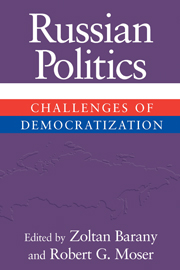Book contents
- Frontmatter
- Contents
- List of Tables and Figures
- List of Contributors
- Acknowledgments
- Introduction: Challenges of Russian Democratization
- 1 Russian Electoral Trends
- 2 Executive–Legislative Relations in Russia, 1991–1999
- 3 The Russian Central State in Crisis: Center and Periphery in the Post-Soviet Era
- 4 Russian Economic Reform, 1991–1999
- 5 Politics and the Russian Armed Forces
- Conclusion: Democracy and Russian Politics
- Index
3 - The Russian Central State in Crisis: Center and Periphery in the Post-Soviet Era
Published online by Cambridge University Press: 05 June 2012
- Frontmatter
- Contents
- List of Tables and Figures
- List of Contributors
- Acknowledgments
- Introduction: Challenges of Russian Democratization
- 1 Russian Electoral Trends
- 2 Executive–Legislative Relations in Russia, 1991–1999
- 3 The Russian Central State in Crisis: Center and Periphery in the Post-Soviet Era
- 4 Russian Economic Reform, 1991–1999
- 5 Politics and the Russian Armed Forces
- Conclusion: Democracy and Russian Politics
- Index
Summary
The close of the twentieth century and the dawn of the twenty-first has brought ever-greater uncertainty for Russia. On the one hand, following the collapse of the Soviet Union in December 1991, citizens of a new Russia gained previously unprecedented freedoms: speech, association, assembly, and choice of leaders. Russians also gained access to foreign-made products, and market relations (although primitive at times) flourished. On the other hand, however, after almost ten years of transition, Russia is neither a consolidated democracy nor a finely tuned market economy. Political, social, and economic problems abound. Among the most pressing of Russia's challenges, however, and a challenge that is at the root of virtually all of the others, is the crucial task of constructing a state capable of extending coherent authority into the eighty-nine provinces that comprise the Russian Federation. This chapter provides some initial insight into the weakness of the Russian central state. I emphasize that autonomy taken de facto by provincial authorities has damaged the administrative capacities of the central state and thus threatens the center's ability to pursue its policy goals in the periphery. This has become so significant a problem for Russia's future economic and political development that within days of his May 7, 2000, inauguration as Russia's second president, Vladimir Putin proposed tough legislative solutions in the hopes of creating a strong, effective central state.
- Type
- Chapter
- Information
- Russian PoliticsChallenges of Democratization, pp. 103 - 134Publisher: Cambridge University PressPrint publication year: 2001
- 37
- Cited by



